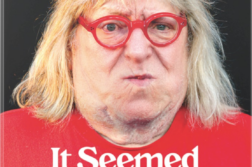ONE of the freshest documentaries of 2009 was Kirby Dick’s Outrage, which brings to light how some of the most homophobic politicians in the U.S. are themselves deeply closeted gay men. Politicians such as Idaho senator Larry Craig, Florida governor Charlie Crist, former New York mayor Ed Koch, and others have done their damnedest to block GLBT equality while engaging in same-sex activities on the sly.
It is Dick’s contention that these politicians are able to remain in the closet thanks to the unwillingness of the mainstream media to talk about their sexuality. (Proving the documentary’s point, NPR’s review of Outrage suppressed the names of the politicians mentioned in the film.) The implications of this reticence are discussed in interviews with House members Barney Frank of Massachusetts and Tammy Baldwin of Wisconsin, former New Jersey governor Jim McGreevey, and others.
Outrage continues Dick’s themes of hypocrisy and GLBT sexuality in American institutions present in his two previous films. His Oscar-nominated Twist of Faith dealt with the Catholic Church’s hypocrisy in publicly condemning homosexuality while privately condoning it. And his excellent This Film is Not Yet Rated compared the treatment of gay versus straight sexuality in mainstream Hollywood movies historically.
With a name that invites jokes, especially in light of his interest in GLBT causes, it may come as a surprise to some readers that Kirby Dick is a heterosexual husband and father. For this exclusive interview, I spoke to Dick about his latest film.

GLR: What were your political intentions with Outrage?
KD: If you look at Jim Kolbe and Jim McGreevey once they are out, they are both pro-gay. But in the closet they were both anti-gay because they were protecting the closet. If you vote pro-gay, people might think you are gay. So my intention was to shed light on this aspect of the American political system. One of the things that helps the closet to persist is the fact that there’s not enough reporting on it. I hoped that by reporting on it, people would become aware of it and politicians, even young people going into politics today, would realize that the personal buttons pushed politically and psychologically are from the closet—whether a particular politician is a Democrat or Republican.
GLR: Should the sexual orientation of a politician matter when passing anti-GLBT laws? Is it not oppressive regardless of who is doing it?
KD: I completely agree. The gay rights issue is the most important human rights issue in this country at this time. But what I’m looking at is the closet and the closet politicians and how the closet actually causes them to act more anti-gay than they normally would.
GLR: Will politicians have to answer to the allegations raised in Outrage during reelection time?
KD: They should. Surprisingly, a lot of them are not. It’s amazing how little the mainstream population is aware of politicians who are in the closet. Then again, that is because the mainstream media haven’t covered it. I’m not saying one should vote for or against a politician based on sexual orientation; in fact, just the opposite. One of the best things that could happen to the gay rights struggle would be if a major national Republican politician came out.
GLR: Maybe this is a continuation of how sexual repression causes oppression in America’s puritanical society?
KD: Certainly that’s a part of the picture. The Christian Right has played a major role in that. On the other hand, a lot of these politicians, even the ones in the closet, are not sexually repressed. One of the things I’ve learned about D.C. is that, not only is it a very gay city, but there are as many, if not more, gay Republicans as there are gay Democrats. A lot more gay Republicans are closeted, but a lot of them are out. A lot of these politicians, the many I focus on, are not particularly sexually repressed at all. They feel like they’re trapped by the homophobia that exists in this society. Particularly as Republicans, they can’t run as an out candidate and win. That’s a mistake. Certainly five years ago that was true, but things are changing.
GLR: Do you think these closeted Washington Republicans lead promiscuous sex lives?
KD: That’s hard for me to speculate. It’s harder to be promiscuous if you’re in the closet.
GLR: This Film is Not Yet Rated opened up discussions resulting in getting the Motion Picture Association of America to review its practices. How might Outrage change the way the media cover Washington politicians?
KD: The media have been reluctant to report on this issue, for a number of reasons. They’re afraid, perhaps, to write something that might be damaging to politicians, particularly if their outlet is owned by a corporation, with ties to Capitol Hill. In other cases, it’s a case of straight reporters who are well meaning and don’t want to “out” someone. But the job of a journalist reporting on politicians is to report on hypocrisy in politics whether it’s gay sexuality or anything else. Then there is still some in the mainstream media who are reluctant to report on subject matter with gay sexuality. Their predominately straight readership might not be comfortable with it. What I have found is that reporters often want to report on these issues, but they don’t make the final decision.
GLR: Why do you continue to cover material dealing with GLBT issues?
KD: A significant portion of This Film is Not Rated was on the double standard of dealing with gay sexuality more harshly than straight sexuality. I believe one hundred percent in human rights for all citizens. Any institution that puts a restriction on anyone’s rights—not just the GLBT population—should be called out for it immediately.
GLR: Despite your sexual orientation, have you been the subject of homophobia?
KD: Not at all. I’m straight. That doesn’t mean you can’t get gay bashed. In elementary and high school more straight boys are gay bashed than gay boys. But if you take a strong position on anything, people with harass you around the block.




